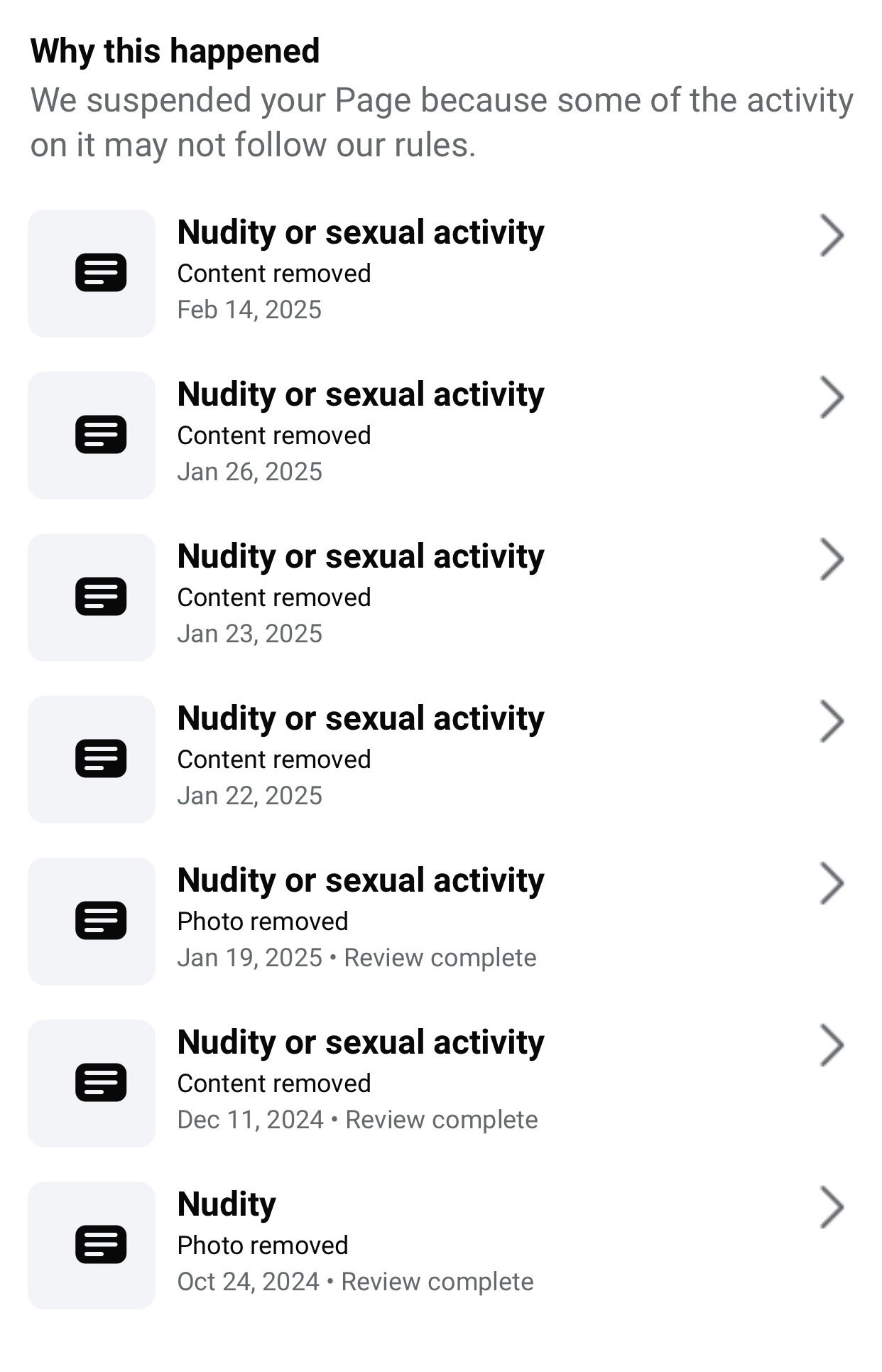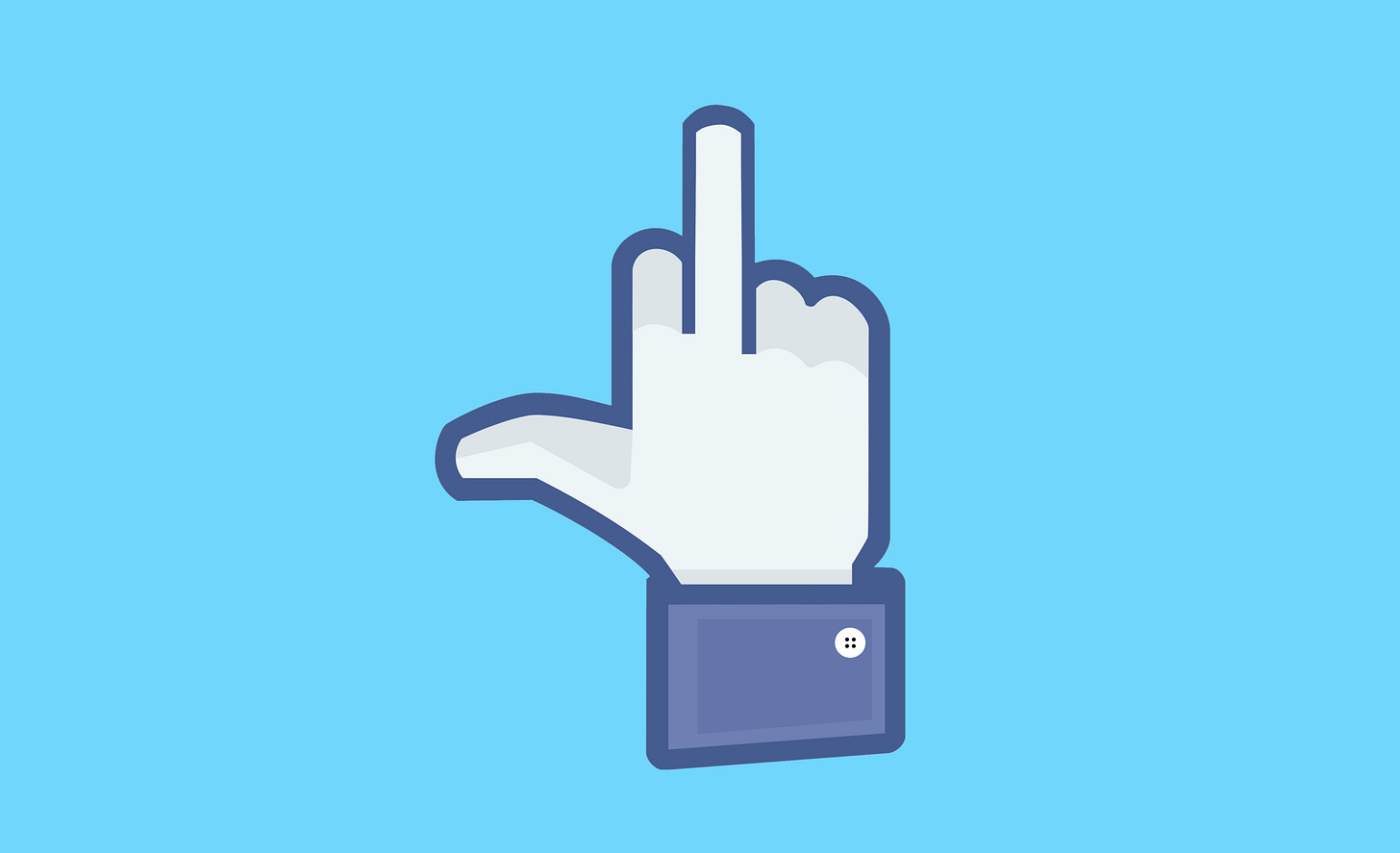
Planet Nude was suspended from Facebook Saturday, after months of escalated warnings and content removals. Each time, I appealed the takedowns, and each time, my appeals were repeatedly denied with little explanation. The content in question? Mostly links to our articles and webcomics—material that follows the general guidelines of Substack and other publishing platforms but, apparently, does not sit well with Facebook’s algorithmic enforcers.
Contradictory standards
Facebook’s official Community Standards prohibit nudity in most cases, explicitly listing each “private part” in painstaking detail—including buttocks, which are generally considered harmless on most platforms—while allowing only a few specific, yet vaguely defined exceptions: breastfeeding, protest, post-mastectomy images, and nudity in paintings and sculptures.
Of course, there’s no definition of what qualifies as a painting, or a sculpture for that matter. Do digital paintings and sculptures count? What about drawings or illustrations? What about drawings that are digitally painted? What about cartoons that use nudity as a form of political speech—would this count as protest? What about photographic nudity that is meant to protest Facebook’s policies? These distinctions about what type of artistic representation of nudity—whether it’s “painted” or “protest” or not—are arbitrary and inconsistent at best.
The assumption seems to be that nudity is inherently dangerous unless it is old and hanging in a museum. And even then, Facebook has a history of censoring classical art—like the time it removed Gustave Courbet’s The Origin of the World or temporarily banned Napalm Girl, one of the most important war photographs in history.
Why this happened
Of the seven recent takedowns that were cited in the suspension notice we received, all but one were webcomics—hand-drawn illustrations consisting of non-sexualized depictions of nudity in everyday, human scenarios. There was no pornography, no graphic content, nary an erection to be found in the lot—just the mere presence of the unclothed human form. But Facebook, a company that profits off engagement-driven outrage and misinformation, is apparently more concerned about cartoon nudists than actual harm being done on its platform.
The rules are vague, inconsistently enforced, and offer no real path for accountability. There is no way to get a human response. No way to challenge the interpretation of the rules. When you appeal a decision, you are not even allowed to actually articulate an argument to go along with the appeal. Just an opaque, automated system that shuts people out of digital spaces without explanation.
Ironically, while Facebook claims to be reducing censorship by ending its third-party fact-checking program in favor of a ‘Community Notes’ system—the exact type of system X implemented just before it became a hotbed for hate speech and alt-right grifting—it continues to over-moderate content that challenges conventional norms.
This contradiction highlights a broader issue: Facebook’s policies are not about protecting users but about maintaining a sanitized platform that suppresses alternative thought. The recent policy changes, including the purported relaxation of certain content restrictions, have been criticized for potentially increasing the spread of harmful content. All the while, Facebook has faced congressional criticism for profiting from advertising that promotes the “nudification” of unwitting victims. Yet, accounts like ours are purged for promoting body positivity and artistic expression.
2+2=4
We can only infer what’s really happening here. I don’t believe Facebook is specifically targeting nudists—what it is really moderating is alternative thought. Anything that falls outside of sanitized, conventional norms is suspect, and naturism falls squarely into that category. Facebook doesn’t want us there. And frankly, we don’t want to be there either. By suspending us, they’ve saved us the trouble of canceling our account.
Coincidentally, we officially deleted our X account just last week (one day before Facebook gave us the boot) after ending all activity on that site back in November. Our departure was a conscious decision not to support Elon Musk, who has leveraged his media empire and immense wealth to sway political outcomes and effectively take control of the executive branch of the government, wielding his oligarchical influence to hobble the legislative branch and several government agencies. I just felt icky participating in that. I have also sold off the remaining Tesla stock I purchased more than ten years ago. If I owned a Tesla vehicle, I’d be looking to offload that as well. And as Facebook founder Mark Zuckerberg has ramped up his sycophantic kowtowing to the new administration—presumably following the Musk model—it’s become easier and easier to imagine leaving that platform under similar conditions.
On Instagram, we get frequent warnings and takedowns, especially for our illustrated and cartoon content, so it’s likely just a matter of time before we’re gone from there too. That will leave us with Bluesky and Substack, which for now, do not operate on an ad model, and thus seem to be more accepting of our content. However, with both vying competitively for market share, it’s not hard to imagine them going the same way the other social platforms have gone as they’ve grown. They are, after all, for-profit businesses looking to make as much money as possible.
Of course, as someone is always sure to point out in the comments when I write about social media, there are niche social sites that cater to naturist interests, such as Naturist Hub, Nude Revolution, or True Nudists. Yes, I’m familiar with MeWe. These platforms can be great for connecting with likeminded individuals, but they’re microscopic in scale compared to the legacy platforms exerting dominant political influence and slowly degrading the public discourse. These sites are fine, we support them like we support many individual nudist influencers. They’re not what I refer to when describing the toxic influence of social media.
These “big” platforms—Facebook, X, Instagram—go beyond just social media websites. They are commercial ecosystems built to curate the appearance of society in ways that are most profitable via an advertising model. What doesn’t fit into their marketable vision is either erased or pushed to the fringes. Naturism, at its core, is about rejecting artificial constructs, about embracing the body as it is, without modification, without shame. That fundamental truth is incompatible with the rigidly controlled, hyper-commercialized image of humanity these platforms enforce. So, it’s tempting to leave them all behind. Maybe, eventually, we will. It’s more likely we won’t have the choice. They don’t want us there anyway. 🪐
Editor’s note: This is an opinion piece and represents the personal perspective of the author.






"Facebook founder Mark Zuckerberg has ramped up his sycophantic kowtowing to the new administration—presumably following the Musk model—it’s become easier and easier to imagine leaving that platform under similar conditions."
Why the anti-Trump and anti-Musk tirades? Zuckerberg completely followed the directions of both Obama and Biden. Blocking and shadowing any person, writer, media who had any conservative points of view. He allowed Biden to tell Facebook who and what would be allowed. How do I know that. Zuckerberg just admitted it.
I'm a nudist, live in a nudist resort, love the interesting articles, stories etc that you post and other substacks, etc. Continue with that. I'm totally interested! But the political thrust, completely one-sided is distracting and worse. I'm a nudist, conservative, traditional Roman Catholic. This kind of dribble will cause me to leave your postings.
I, too, deleted my personal X account and am just on Bluesky now. Facebook has been a problem for a long time for Canadians, especially journalists: we can't post any of our newspaper's articles there because they have banned them. I can still post links to substack articles, though, because it is an American platform. I'm still on facebook to keep in touch with old high school friends and such, but am looking forward to the day when I can pull out of there entirely.